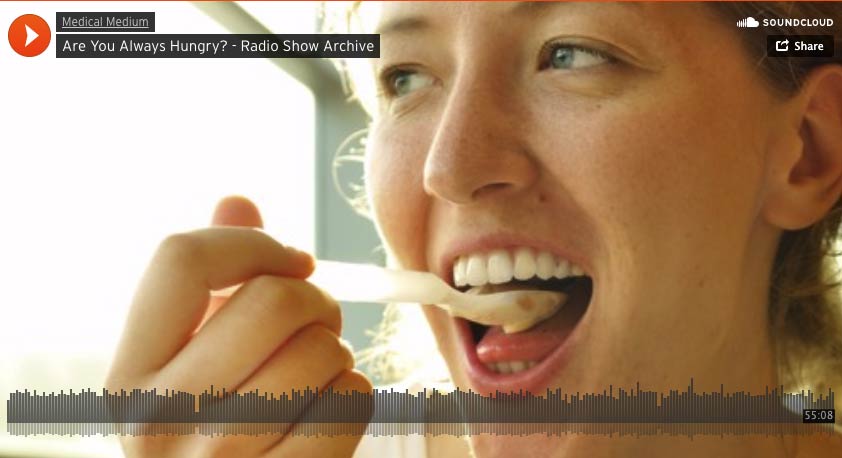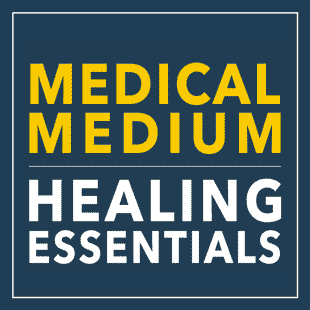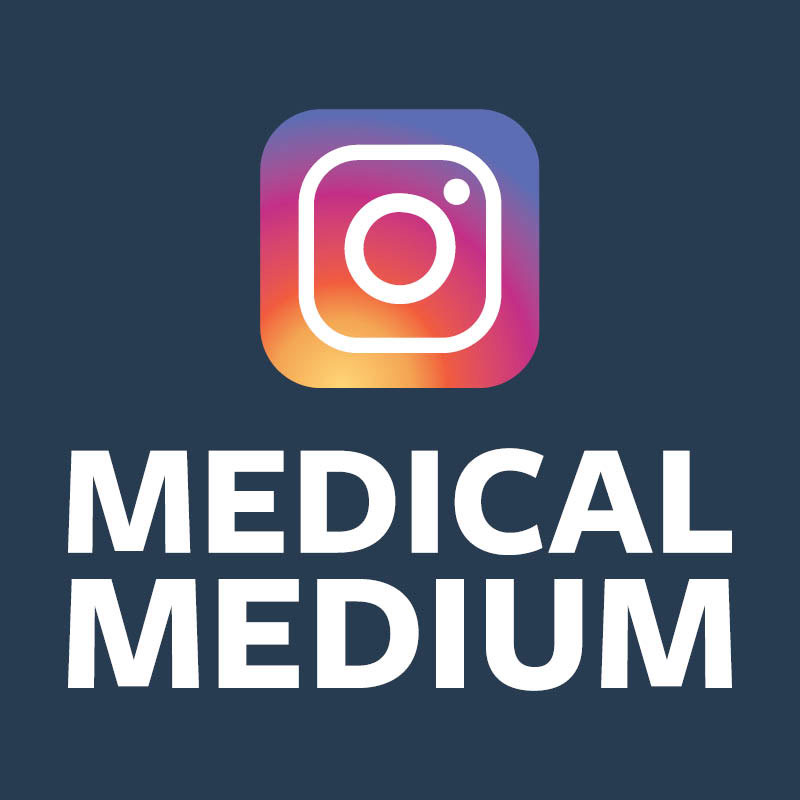Watch: Are You Always Hungry?

Are You Always Hungry?
Just like weight gain, mystery hunger is an issue that is often treated unkindly. But regardless of what someone might have said to you, there is nothing wrong with you as a person. It is not gluttony, it is not a character defect. There is a real reason why you are experiencing insatiable hunger. Different doctors have brought different theories to the table to explain away this condition, including psychological overeating disorder; a miscommunication in the brain; a stomach disorder; hormonal disorders due to pregnancy, ovulation, or menopause; hyperthyroidism; seasonal affective disorder (SAD); depression; diabetes; and acid reflux. The list goes on—and these are painful diagnoses to receive. You might feel at odds with your own body or mind. The truth is, though, that none of these diagnoses truly get to the heart of the matter. As I have shared many times before, there are so many mystery symptoms and conditions that medical science and research do not have the answers to. Today, we are going to uncover what is really to blame for your constant hunger. And for an even greater understanding, you can refer to the in-depth explanation I offer in my book, Medical Medium Liver Rescue: Answers to Eczema, Psoriasis, Diabetes, Strep, Acne, Gout, Bloating, Gallstones, Adrenal Stress, Fatigue, Fatty Liver, Weight Issues, SIBO & Autoimmune.
A Starving Liver
What could possibly make you want to eat so much? A starving liver—a liver that is in desperate need of the three Cs: critical clean carbohydrates. What your liver is not hungry for is fat calories, which most everyone is consuming in high quantities. What it’s really starving for is glucose from fruits and carbohydrate rich vegetables like potatoes, sweet potatoes, and winter squashes. However, when there is fat in the liver and in the blood from the high fat foods most of us consume from the time we begin eating solid foods, the liver is unable to access any glucose we do eat. If you’re thinking that you don’t eat a high fat diet, it’s important to know that high protein diets are actually high fat diets. Almost every high protein food is inherently high in fat also, including eggs, chicken, nuts, seeds, milk, cheese, fish, beef, bacon, tofu, and more. Some of these foods like eggs and dairy are best avoided because of the ways they contribute to chronic illness and symptoms, which I explain in Liver Rescue. Other high protein and high fat foods can still be included, but it’s important they don’t dominate your diet so you can make space for more glucose-rich foods like fruits, potatoes, and winter squashes. To fully understand why the high protein and high fat trends have gained so much traction and what you can do about it, I wrote a whole chapter on this topic in Liver Rescue.
Now you know that your liver is starving for glucose. It’s this desperate need for glucose that drives the intense hunger people can experience where they feel like they can just keep eating and eating. A healthy liver has built up glycogen reserves. These reserves are compacted glucose in the tissue used to fuel your body, keep your organs healthy, and prevent disease. When the liver is forced to store fat instead, it loses its glycogen storage and begins to deteriorate. Fats also inhibit glucose from entering into the cells of other organs with ease. The heart, for example, is a muscle that requires glucose, or it weakens. In this case, no matter a person’s incredibly fit physique, he or she can eventually be heart attack bound if the diet is always too high in fat or protein and not enough glucose. Until fat is lowered in the diet so glucose can get into the liver and other cells and organs of the body, and there is sufficient glucose from fruits and carbohydrate rich vegetables being consumed, the liver will keep crying out for more of the fuel it needs, which means the constant hunger someone is experiencing will continue. Once the liver gets the breaks from fat it needs and sufficient glucose, and has the opportunity to heal, the constant hunger will begin to fall away.
Liver Stressors
In addition to fats, our livers are under stress from pathogenic activity in our bodies. Viruses and bacteria sit in the liver and feed off of toxic heavy metals (think: copper, steal, mercury, lead, alloys, and many more). Some people might have one or two varieties of streptococcus, for example, as opposed to others with five or eight varieties, while someone else might have a different bacteria and a virus like HHV6. But do not be deceived—everyone has viruses in the liver, Epstein-Barr being the most common, and bacteria like streptococcus. Pharmaceuticals, pesticides, and plastic residue also accumulate to create a landfill in the liver that further prevents it from accessing glucose. For a full list of the hundreds of different “Liver Troublemakers” that can affect the health of your liver, check out Liver Rescue. While some of them are a part of our everyday lives that can’t be avoided, others can be minimized or you can prevent exposure or consumption altogether. All of these troublemakers, in addition to too much fat and protein in the diet, can lead to a sluggish or fatty liver, which is always present in someone with mystery hunger. If you are not feeling the effects of a fatty or stressed liver causing the mystery hunger symptom now, it doesn't mean you aren’t living with other symptoms caused by a stressed liver. Unfortunately this burden the liver carries will finally catch up with you. However, with the right foods and healing steps, you can turn this around and bring your liver back to health.
What Can You Do?
I am not talking about table sugars when I tell you your sugar intake needs to increase. Fruit, sweet potatoes, all varieties of potatoes, and winter squashes are your answers. Do not be afraid of the word fructose. Do not cheat yourself from healing fruits like apples, berries, melons, grapes, bananas, peaches, and plums. Fruit fear is rampant today and it’s absolutely critical for your health and your loved ones’ health that you know the truth about fruit. That’s why I covered this topic in a radio show and article. When the liver’s glucose needs are satisfied, it shuts down your hunger signal. All of the above are perfect examples of critical clean carbohydrates that refuel the liver.
Mineral salts are another part of the equation. This means adding more leafy greens, celery, spinach, brussels sprouts, and asparagus into your diet. Of course, and perhaps most importantly, do not forget to drink your celery juice. If you can, try to drink at least 16 ounces of straight celery juice a day. The mineral salts in celery juice will help your liver rid itself of the sludge that is hanging around from unwanted viruses and other toxins.
As always, along with these do’s there are also a few don’ts. Whether you are vegan, paleo, or vegetarian, it is time to reduce the amount of fat in your diet for the reason I have shared. Even lean meats are full of fat. You do not have to eat the chicken skin to consume fat. Fat runs throughout all meats, in its juice, and in fish oil. When you think protein, think fat. For the meat-eaters out there, that means reducing your meat consumption to once a day. For vegetarians, cut out the eggs and dairy products for this reason but also the many other reasons I share in Liver Rescue. Vegans, limit the amount of nut butters, tahini, oils, and avocados you are eating. By eating too much of any of these foods, we are doing serious damage to our livers in the long run.
Moving Forward
Remember, you are supposed to get hungry during the day and it’s good to snack on the right foods every hour and a half to two hours for your adrenals (I share more on this in my books), but constant or insatiable hunger is a signal, a call for help from your liver. It is a sign of a fatty or pre-fatty liver—that the organ is stressed and unable to store glucose. At one point in time, conventional medicine knew that a high-fat diet meant fat build-up in the organs. But with an influx of trends and marketing campaigns and hidden agendas at industry level, the truth has been swept under the carpet. Do not be afraid to heal with the right information, which is truths I share here and in Liver Rescue. Sometimes there are emotional crises that can set us back when it comes to our health and our eating habits. The important thing is that we keep putting one foot in front of the other and making the best choices we can at any time. If you need help changing your diet or creating great meals, Liver Rescue includes many delicious low fat recipes that include foods that are healing to the liver. Take it one day at a time—your hunger is not something to conquer, nor is it a shortcoming. It’s a signal that your liver needs you and it can be turned around.
This item posted: 26-Oct-2018
The information provided on this Site is for general informational purposes only, to include blog postings and any linked material. The information is not intended to be a substitute for professional health or medical advice or treatment, nor should it be relied upon for the diagnosis, prevention, or treatment of any health consideration. Consult with a licensed health care practitioner before altering or discontinuing any medications, treatment or care, or starting any diet, exercise or supplementation program. Neither Anthony William nor Anthony William, Inc. (AWI) is a licensed medical doctor or other formally licensed health care practitioner or provider. The content of this blog and any linked material does not necessarily reflect the opinions of Anthony William, AWI or the principal author, and is not guaranteed to be correct, complete, or up to date.
Thanks for printing this post. For more, visit www.medicalmedium.com


